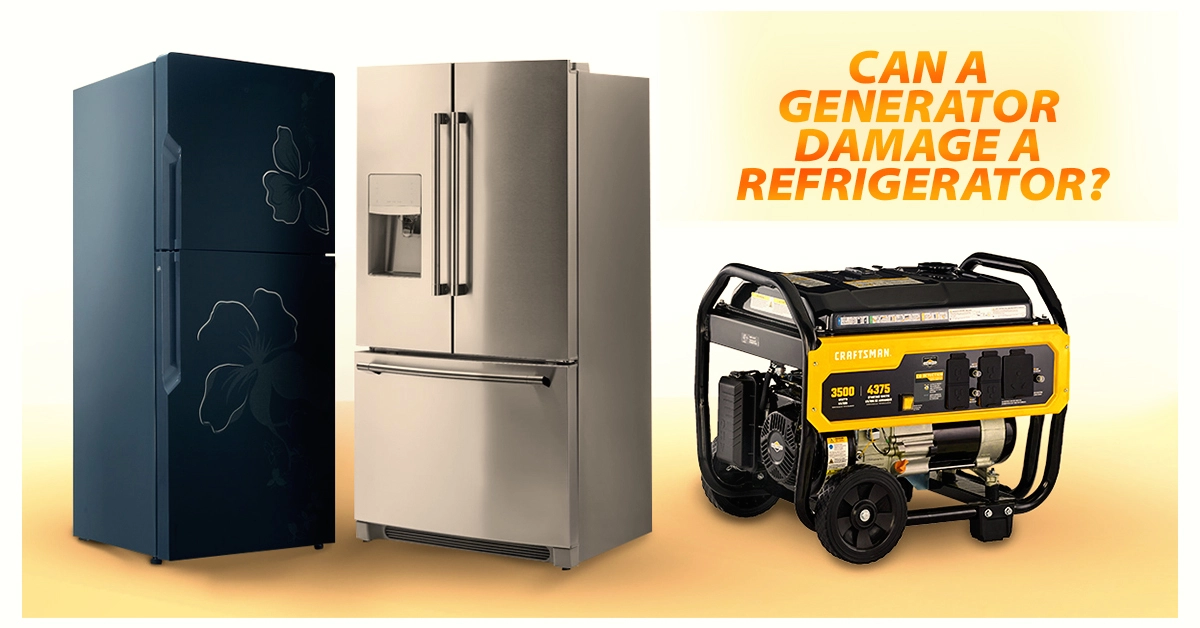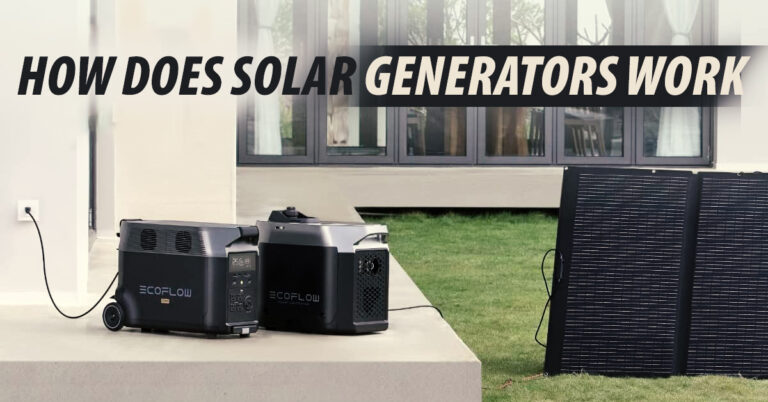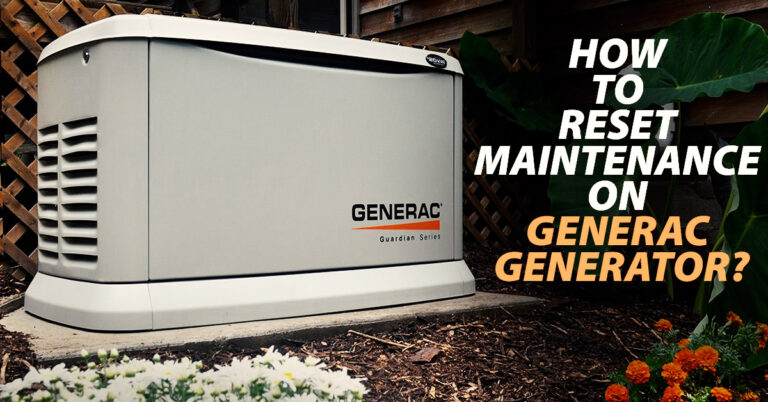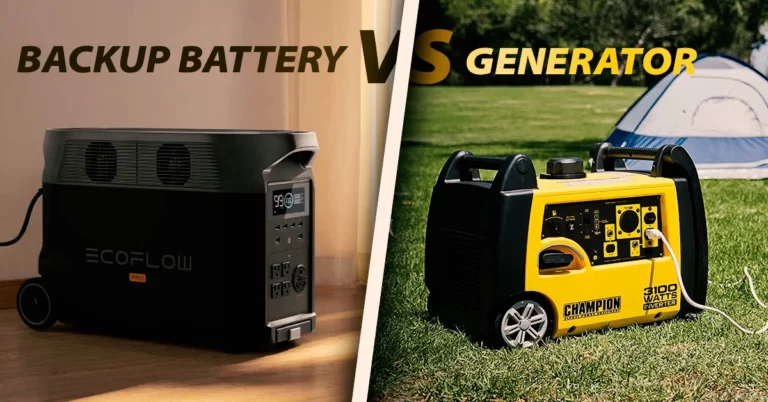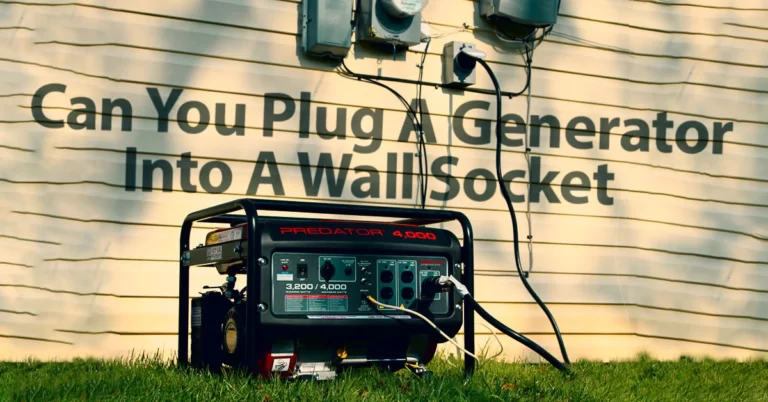Can A Generator Damage A Refrigerator?
Once, I used a generator to power my refrigerator and other appliances. However, my refrigerator suddenly stopped working, leaving me puzzled. Determined to find answers, I discovered the question, “Can a Generator Damage a Refrigerator?” This led me on a quest to understand the risks and safety tips associated with using a generator for refrigerators. I learned to avoid damage, choose the right generator size, and run a refrigerator efficiently. Exploring the benefits of using a generator with a refrigerator and following safety precautions became essential. If you’re facing issues or have questions about using a generator for your refrigerator, join me as we explore the details and protect our appliances.
So, Can A Generator Damage A Refrigerator?
The impact of your generators on refrigerators depends on proper usage. Improper usage, lack of maintenance, and overloading can cause damage. However, using a generator with sufficient power and staying within its limits shouldn’t harm the refrigerator. Calculate power consumption, ensure a stable power supply, and consider using dedicated circuits or RV generators for better compatibility. Use proper socket connections and precautions to avoid power fluctuations. If issues persist, contact customer support or seek professional assistance for guidance.
How Can a Generator Damage a Refrigerator or Freezer?
During a blackout, using a generator to power your refrigerator and freezer can be practical. However, it’s crucial to be aware of the dangers. To prevent causing harm to your equipment, follow the correct procedures.
Overloading the generator can damage the refrigerator
Overloading the generator with multiple appliances can have detrimental effects, especially on your refrigerator and other connected devices. When the total power consumption surpasses the generator’s capacity, it can strain to handle the load, potentially damaging all appliances.
Generator’s Insufficient Power
Insufficient power supply can result in problems with the refrigerator’s compressor and other components. When the generator lacks enough power to support the regular switching on and off of the compressor, it can strain the refrigerator’s operation and potentially cause damage over time.
Carbon Monoxide Hazards
Carbon monoxide gas is an odourless, colourless gas that may produce ced by generators that can be deadly if inhaled, so proper placement is essential. Positioning the generator outdoors and away from windows or doors is important to prevent carbon monoxide poisoning.
Generators can pose a fire hazard
Generators can pose a fire hazard to appliances or themselves if not used according to the manufacturer’s instructions. Following the guidelines and keeping the generator dry help prevent potential fires.
- According to the US Fire Administration, using generators contributes to around 2,500 residential fires annually. These fires commonly arise from improper generator placement near the house or flammable materials near the generator. These factors significantly increase the risk of fire incidents. Therefore, following proper safety guidelines when using a generator to power your refrigerator and freezer during a power outage is crucial.
Noise pollution
C. Noise generated by generators can be disruptive to neighbours. Running the generator during the day instead of at night shows consideration for others.
Electrocution Risks When Using Generators
When using generators, it’s crucial to prioritize safety to prevent the risk of electrocution. Never operate a generator indoors, including in your home or garage, as toxic fumes like carbon monoxide can accumulate. It’s also important to avoid touching the generator with wet hands or using it in wet conditions to minimize the risk of electrical shock. It is crucial to take certain safety precautions to operate a generator safely.
Without Power Awareness can cause damage
Proper understanding of how a refrigerator works is important to avoid damage. Awareness of the refrigerator’s operation and power requirements helps ensure the generator adequately supports its needs.
CAN A POWER SURGE DAMAGE A REFRIGERATOR?
Power surges damage refrigerators by overloading their sensitive electronic components with sudden increases in voltage.
Causes of Refrigerator Power Surges
A. Lightning Strikes
Lightning strikes frequently bring on power surges. When lightning strikes a power line or nearby electrical system, it generates a massive surge of electrical energy that can reach and affect connected appliances, including refrigerators.
B. Power Fluctuations during Power Outages
Fluctuations in electrical voltage occur when power is restored after outages, known as power spikes. These fluctuations pose a risk to your refrigerator’s electrical components.
C. Refrigerator Cycling Causing Surges
Normal refrigerator cycling events can create small power surges within the appliance. Prolonged cycling or faulty components can lead to larger and potentially damaging surges.
Potential Damages
A. Circuit Board Fuses
Power surges can blow or damage fuses on the refrigerator’s circuit board, disrupting the electrical flow and rendering certain refrigerator functions inoperable.
B. Motor Damage
Refrigerator motors, including those for the compressor and fans, are susceptible to damage from power surges. The surge of electrical energy can overload the motor’s internal components, leading to malfunctions or complete failure.
C. Compressor Damage

Power surges can damage the compressor, resulting in decreased cooling efficiency or a complete breakdown, requiring repairs or replacement.
How Can You Avoid Damaging Your Refrigerator With a Generator?
Ground the generator to protect the refrigerator:
Did you know properly grounding your generator is essential for keeping your refrigerator safe? When the generator is grounded correctly, it provides a safe route for dissipating excess electricity. This helps protect the delicate components of the refrigerator from any electrical harm.
Avoid overloading the generator:
I want to share something important about connecting our refrigerator to the generator. Before doing so, make sure to check the wattage rating of the fridge and make sure the generator can handle that power. Overloading the generator can cause problems and damage the fridge and the generator. By matching the wattage correctly, we can avoid any damage from too much power.
Use a surge protector with the generator:
Protect your refrigerator by using a surge protector with your generator. It shields against power surges during electrical fluctuations, safeguarding the sensitive components of your fridge. Choose a surge protector designed for appliances to ensure long-lasting safety and reliability.
Use shorter extension cords to prevent voltage drop
Just a quick tip for you. When using a generator and connecting your refrigerator with an extension cord, go for a heavy-duty, 12-gauge cord. Keep the cord length under 100 feet to prevent voltage drop. Long cords can cause damage to both the generator and your appliances, including the fridge.
Prevent Damage: Run Your Generator on a Level Surface
When using a generator, always keep it on a flat surface. Generators rely on an oil-dipping system to lubricate their parts effectively. The oil won’t distribute properly if placed on a slope, leading to potential damage. To avoid problems, keep your generator level for smooth operation and protect your generator and fridge.
How to Properly Use a Generator and Safe Refrigerator?
I. Ensure proper generator usage and monitoring
- Use a heavy-duty extension cord to prevent overheating and fires
- Regularly monitor your generator for any unusual smells or smoke
II. General safety tips for running a generator
- Refuel only when the generator is turned off and cooled down
- Keep the Generator dry to avoid the risk of electrocution
- Avoid running the generator in enclosed spaces to prevent carbon monoxide poisoning
- Safely store fuel in approved containers and use the recommended fuel types
III. Specific safety guidelines for portable generators
- Maintain a proper distance from structures and ensure adequate ventilation
- Allow the Generator to cool down before refuelling
- Avoid attempting to powerhouse wiring through the generator
- Keep a fire extinguisher nearby and install a carbon monoxide monitor in your home
What size generator do I need to run a refrigerator?
Finding the right generator size is crucial for running your refrigerator efficiently and avoiding power-related issues.
Power Consumption of Refrigerators:
Modern refrigerators typically require around 900 to 1,200 starting watts, with some models needing even more. To determine the exact wattage requirements, refer to the manufacturer’s manual for accurate information on starting and running watts. You should use a generator with at least 2,000 starting watts for safe and efficient operation. This ensures the generator can handle the initial power surge needed to start the refrigerator’s compressor without straining or potentially damaging the appliance.
Understanding High Starting Watts
Appliances such as refrigerators require significant power during startup due to the electric motor’s initial resistance. This power surge, lasting 2 to 10 seconds, can be 4 to 8 times higher than the appliance’s regular power requirement. Therefore, when selecting a power source like a generator, it is essential to ensure it can handle this high starting wattage. Understanding the concept of high starting watts is crucial in choosing the appropriate power capacity for appliances like refrigerators.
Generator Sizing for Different Refrigerator Types
Generator sizing for different types of refrigerators depends on their power consumption. Here is a breakdown of the power requirements for various refrigerator sizes:
| Type of Fridge | Running Watts | Additional Starting Watts |
|---|---|---|
| Mini Fridge | 85 – 100 W | 127 – 150 W |
| Smart Fridge | 250 – 500 W | 375 – 750 W |
| Under-Counter Refrigerator | 90 – 140 W | 120 – 210 W |
| Modern Fridge (2001-2020) | 100 – 400 W | 150 – 600 W |
| Side-by-Side Fridge | 792 W | 1,188 W |
| Refrigerator Showcase | 210 W | 315 W |
| Old Type of Fridge (1993-2000) | 200 – 800 W | 300 – 1,200 W |
| Mini Glass Refrigerator | 140 W | 210 W |
| Mini Freezer | 35 – 50 W | 52 – 75 W |
| Deep Freezer (Chest) | 350 – 500 W | 525 – 750 W |
| Counter-Top Fridge | 160 W | 240 W |
Selecting the right generator size for your refrigerator involves considering the starting wattage. Choose a generator with sufficient starting wattage capacity to handle the initial power surge and sustain the efficient operation.
Conserving Generator Power and Tips for Running Refrigerator
I have some important tips for conserving power when running your refrigerator with a generator. These tips will help keep the motor running smoothly and save energy. Here’s what you can do:
- Start and stop the refrigerator less frequently to extend the motor’s lifespan and reduce wear and tear.
- Ensure the wattage requirements of your refrigerator match the capacity of the generator to avoid overloading and potential damage.
- Take advantage of your refrigerator’s ability to stay cold without power for a limited time, especially during planned outages. This can reduce strain on the generator.
- Keep your freezer fully stocked. A full freezer retains cold temperatures better, minimizing temperature fluctuations and saving energy.
- Optimize power consumption by reducing heat transfer. Place the refrigerator in a well-ventilated area away from direct sunlight and heat sources. Clean the coils regularly for better heat dissipation. Also, ensure the door is properly sealed to prevent cold air from escaping.
Maximize Generator and refrigerator efficiency with these tips for energy savings and longevity.
Running Multiple Appliances and Generator Selection
When using multiple appliances simultaneously, it’s important to consider how much power they need when they start up. Here are some tips to help you out:
Think about starting watts:
Appliances with motors or compressors need more power when they first turn on. Keep this in mind when figuring out how much power you’ll need.
Get the right-sized Generator:
Choose a generator that can handle the starting watts of all your appliances combined. This way, you’ll have enough power to handle the extra energy they need initially.
Use appliances one at a time:
To save power and avoid overloading the generator, try using appliances that need a lot of power at different times instead of all at once.
Pick a generator with extra power:
If you choose a generator with a bit more power than you need, like 15-20% more, you’ll have a backup and won’t have to worry about running out of power.
Generator Types and Fuel Options
Inverter generators are a great choice for powering sensitive devices due to their stable and clean energy output. They are fuel-efficient, quiet, and emit fewer emissions than conventional generators. Inverter generators can run on gasoline or propane or offer dual fuel capability.
Solar-powered generators are environmentally friendly but may not be suitable for high starting watts required by appliances like refrigerators. However, they can power smaller devices and backup power for low-wattage electronics.
Running Only a Refrigerator on a Generator
When running your refrigerator on a generator, selecting one with sufficient starting wattage capacity is crucial, as mentioned in the refrigerator’s manual. Use a transfer switch or appropriate extension cord to connect the refrigerator securely to the generator, ensuring efficient power transmission. Following these steps, you can power your refrigerator safely and reliably, even during power outages, and keep your food fresh and preserved.
Calculating Wattage and Consumption Management
To determine the wattage of a refrigerator, multiply the voltage (V) by the current (I) in amps (A). For instance, if the refrigerator operates at 110V and draws 4A, the wattage would be 440W.
Differentiate between running and starting consumption in appliances. Running consumption is continuous power used during normal operation. Starting consumption is a temporary power surge when the refrigerator’s motor starts. When using multiple appliances, calculate the total wattage, considering running and starting consumption. Ensure your generator can handle the combined wattage and stagger the operation of high-wattage appliances to avoid overloading.
How Long Can a Refrigerator Run on a Generator?
Consider the duration and frequency of operation when using a generator for your refrigerator. Most refrigerators stay cold for about four hours after a power outage, and connecting to the generator for one hour extends this stability. Running the generator continuously is only sometimes necessary.
The generator model, wattage, and fuel capacity affect running time. Calculate the refrigerator’s power needs and be prepared for unexpected situations. Continuous operation strains the generator and increases fuel consumption. Use a wireless thermometer to monitor temperature and optimize generator usage. Considering these factors, you can efficiently maintain fresh food with your generator.
Can a Small Generator Power a Fridge?
Using a Small Generator to Power Your Fridge: Important Considerations
- Protecting Your Appliances: Grounding and Surge Protection
- Ensure proper grounding and surge protection to prevent damage from the generator’s magnetic field.
- Converting AC to DC: The Role of an Inverter
- To safely power your refrigerator with a generator, consider using an inverter. An inverter can convert the AC electricity generated by the generator into DC power, which is compatible with most fridges.
- Checking Power Capacity: Wattage Requirements
- Verify that your generator has enough power capacity to provide the required wattage for your fridge, typically 700 to 1200 watts.
- Considering Power Surge: Startup Power Requirements
- Consider the power surge when a fridge starts and ensure your generator can handle the initial burst of power.
- Efficient Power Management: Optimizing Generator Usage
- Maximize the effectiveness of your small generator by minimizing fridge usage, adjusting temperature settings, and implementing power-saving practices.
- Additional Protection: Power Management Devices
- Enhance protection for your appliances and generator by using voltage regulators and surge protectors to regulate electrical flow and prevent voltage fluctuations or power surges.
- Seeking Expert Advice: Manufacturer or Electrician Consultation
- If you have any doubts or questions regarding power requirements and compatibility, consult the fridge manufacturer or a qualified electrician for professional guidance and recommendations.
Types of generators
Absorption refrigerators for Generators
Absorption refrigerators are unique refrigeration systems that use a heat source instead of electricity, making them ideal for generator use. When choosing an absorption refrigerator for a generator, consider the generator size and ensure it can handle the refrigerator’s power requirements. Verify fuel compatibility between the generator and refrigerator. Check the warranty to ensure coverage for repairs or replacements. RV absorption refrigerators are popular for recreational vehicles with LP gas or electric power. “2-Way” fridges operate on LP gas and electric power, while “3-Way” fridges run on AC, LP gas, and DC power. Factors like altitude and cooling time should be considered, as higher altitudes may affect absorption refrigerators and take time to cool down when turned on.
Compressor Refrigerators for Generators
Compressor refrigerators are excellent for keeping food cold during power outages with a generator. They use the generator’s engine to power a compressor that circulates the refrigerant, maintaining a cool temperature by transferring heat from the interior to the outside air.
When choosing a compressor refrigerator for your generator, consider the size, type of compressor, power consumption, noise level, and price. These refrigerators are commonly found in RVs and offer faster cooling, higher efficiency, and resilience to altitude variations.
What Are the Benefits of Using a Generator With a Refrigerator and Freezer?
Benefits of Using a Generator With a Refrigerator and Freezer:
Food Preservation:
Ensure the freshness of perishable items during power outages, preventing spoilage and maintaining food safety.
Convenience:
Eliminate the need for constant power supply monitoring and worry about food spoilage, providing peace of mind during extended power disruptions.
Emergency Preparedness:
Access essential food supplies during natural disasters or emergencies, maintaining a sense of normalcy and reducing reliance on external resources.
Cost Savings:
Avoid replacing spoiled food items, saving money in the long run and eliminating the expense of alternative cooling methods like ice or coolers.
Home Comfort:
Power other essential appliances and systems, such as lights, fans, heating, and cooling systems, ensuring a comfortable living environment during power interruptions.
Business Continuity:
Protect the freshness of inventory and maintain operations in businesses relying on refrigeration, preventing financial losses and customer dissatisfaction.
Will an inverter generator Run a Refrigerator?
Running a refrigerator with an inverter generator is possible, but there are important considerations. Inverter generators provide clean power, ensuring safety for sensitive electronics. Consult the manufacturer about warranty and risks. Check the power requirements of your refrigerator and choose a generator with sufficient wattage capacity. Follow manufacturer instructions for safe usage. These precautions allow you to power your refrigerator effectively and prevent damage.
FAQs
-
Can a generator damage appliances?
If not used correctly, a generator can damage appliances. Improper grounding and overloading can lead to electrical damage or even fires. Following safety instructions and using the appropriate generator for your appliances is crucial.
-
How can I protect my appliances when using a generator?
To protect your appliances, ensure the generator produces enough electricity, has an adequate fuel supply, and turns off appliance power before connecting them. Surge protectors can also safeguard against power spikes and damage caused by lightning or outages.
-
Do I need a surge protector when using a generator?
A surge protector with a generator is recommended to provide extra protection for your appliances. Surge protectors divert excess voltage, preventing potential damage during power fluctuations or spikes.
-
How long should a generator cool down?
The cooling down time varies based on size, fuel type, running hours, and ambient temperature. As a general guideline, generators should cool down for at least 10-15 minutes before shutting off. Always refer to the manufacturer’s guidelines for specific requirements.
-
Is a generator necessary for a chest freezer?
While not mandatory, a generator can power a chest freezer during outages, preventing food spoilage. Ensure the generator has enough capacity to handle the starting and running wattage of the chest freezer.
-
Are generators dangerous?
Generators can only be safe if used properly. Running a generator indoors can cause carbon monoxide poisoning, and leaving gas cans near the exhaust can lead to fires. Operating generators in well-ventilated areas, following safety guidelines, and carefully handling fuel are essential to minimize generator risks.
End Words
When considering the question, “Can a generator damage a refrigerator?” it is crucial to understand the potential risks and take preventive measures. You can safeguard your refrigerator from potential harm by following the guidelines, such as understanding power requirements, selecting the right generator size, and prioritizing safety. Additionally, using a generator can offer the benefit of preserving food during power outages. By being mindful of safety precautions and making informed choices, you can confidently utilize a generator to power your refrigerator without causing any damage.

